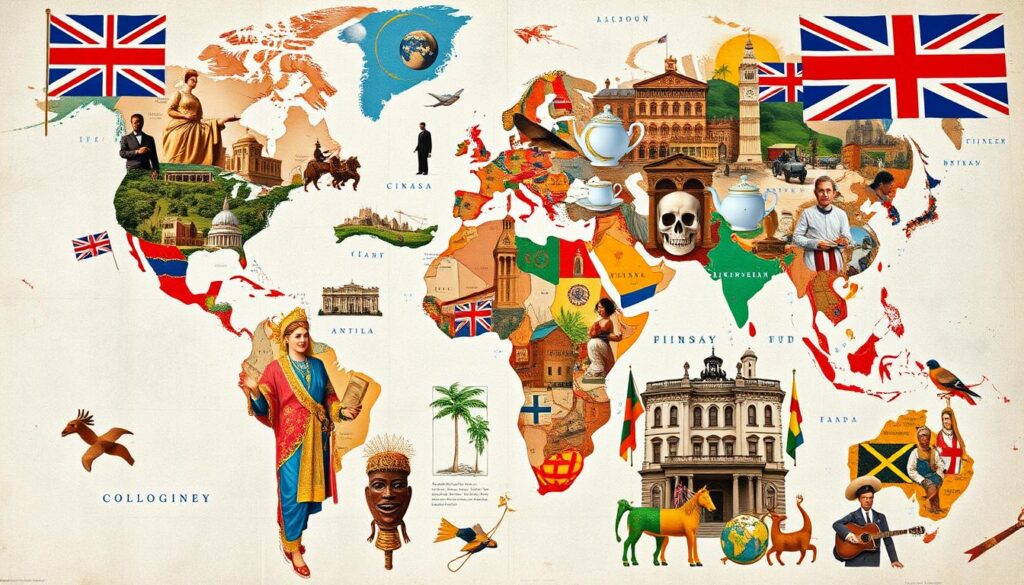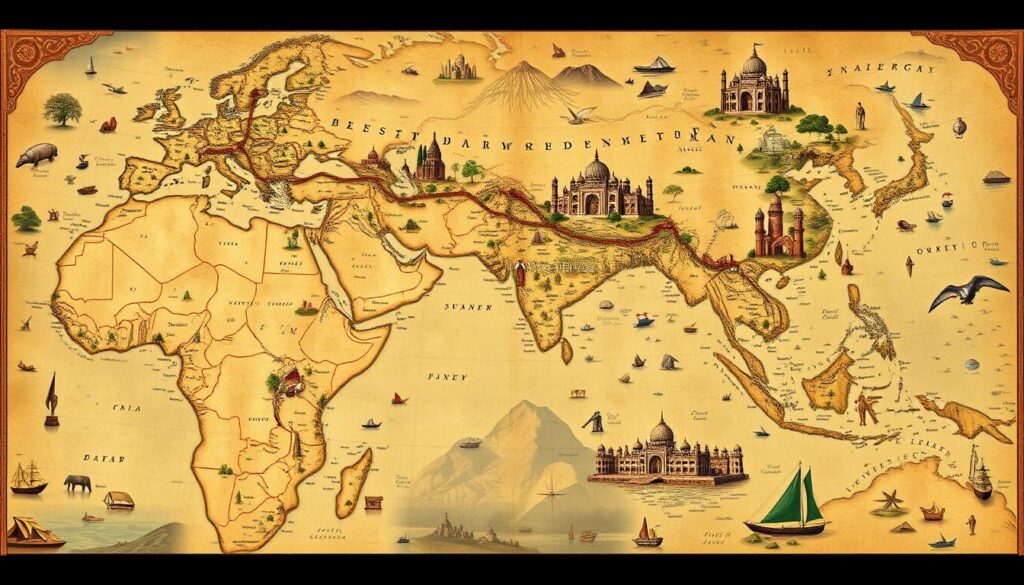The British Empire was a huge and influential empire in history. It left a lasting mark on the world. From the 16th to the 20th century, the UK’s ambitions took it across continents. It shaped politics, economies, and cultures of many nations.
This article looks at the rise and fall of the British Empire. We explore its expansion, colonial ventures, and its lasting impact on today’s society.
Key Takeaways
- The British Empire was one of the largest and most influential empires in world history, spanning across continents and shaping global politics, economics, and culture.
- The article explores the factors that drove the expansion of the British Empire, including the rise of British imperialism and the early colonial ventures.
- The article examines the East India Company’s dominance and the strategies of control and administration used by the British in their territorial conquests and colonization efforts.
- The global reach of the British Empire, its trade routes, naval supremacy, and the economic impact of industrialization are also discussed.
- The article delves into the cultural influence of the British Empire, the spread of British values, and the resistance and assimilation experienced by colonized populations.
The Rise of British Imperialism
The British Empire grew across the world for many reasons. The Victorian era was a key time for this growth. The East India Company and the British Crown wanted to control more land.
Factors Driving Expansion
Several things pushed the British Empire to grow. They wanted to be the top power, control trade routes, and find valuable resources. The Suez Canal project helped them control key sea paths.
Politics and military might were also important. Queen Victoria and Winston Churchill led the push to expand the empire. They used their power to grow the empire’s influence worldwide.
Early Colonial Ventures
The British Empire’s early moves, like the Opium Wars and the Raj in India, set the stage for its rise. These actions showed the Empire’s readiness to use force to get what it wanted. This approach shaped its colonial growth.
This famous saying shows how big and widespread the British Empire was. It covered many lands and had many colonies. The Empire’s growth was driven by economics, politics, and technology. These factors helped it become a major world power.
The East India Company’s Dominance
The British East India Company was key in growing the British Empire in India. It changed the area’s economy and politics. It also deeply influenced the cultural influence and historical legacy of the region.
Started in 1600, the East India Company began with global trade. It set up trading posts and factories in India. As time went on, it took on more political and administrative roles, becoming a major force in the east india company‘s rise.
| Key Milestones in the East India Company’s Dominance | Year |
|---|---|
| Royal Charter granted by Queen Elizabeth I | 1600 |
| Establishes first trading post in Surat, India | 1613 |
| Gains control of Bengal, a major Indian province | 1757 |
| Becomes the de facto ruler of large parts of the Indian subcontinent | 1857 |
The East India Company’s power grew from its smart trading, diplomacy, and the Mughal Empire’s instability. As it grew, it shaped the cultural influence and historical legacy of India, leaving a lasting impact.
“The East India Company’s dominance of the Indian subcontinent was a testament to its commercial acumen and political maneuvering, forever altering the course of the region’s historical legacy.”
Territorial Conquests and Colonization
The British Empire wanted more and more, leading to the colonization of huge parts of the world. They were involved in the transatlantic slave trade and created the pax britannica. Their mark on the world was huge, affecting both land and culture.
Key Colonies and Territories
The British Empire’s reach was vast, covering places like India, Canada, Australia, New Zealand, and much of Africa. These places were used for exploitation and cultural assimilation. The British wanted to keep a strong hold on these areas.
Some key colonies were:
- India, seen as the empire’s most valuable asset, controlled by the East India Company and later the government
- Canada, a huge area that became a self-governing part of the Commonwealth
- Australia and New Zealand, where native people faced the harsh effects of colonization and decolonization
- Large parts of Africa, divided and used during the Scramble for Africa
Strategies of Control and Administration
The British used many ways to keep control over their colonies. They set up colonial governments, pushed for cultural assimilation, and used the military to stop any opposition.
| Strategy | Description |
|---|---|
| Colonial Administration | The British created detailed systems to rule their colonies. They often chose local leaders to help keep control. |
| Cultural Assimilation | The British tried to make everyone speak their language, follow their religion, and adopt their customs. They wanted a unified culture across the empire. |
| Military Force | The British army was key in crushing any opposition. They used their technology and organization to keep their colonies in line. |
This famous saying shows how big and widespread the British Empire was. At its peak, it covered nearly a quarter of the world’s people and land. The impact of this vast empire is still felt today in politics, economics, and culture.
The British Empire’s Global Reach
The British Empire’s power came from its wide trade routes and unmatched naval strength. In the Victorian era, it grew by controlling the seas. This allowed it to set up colonies and trading spots all over the world. Its skill at sea was key to its historical and cultural impact.
Trade Routes and Naval Supremacy
The British Empire’s reach was based on its control of key trade paths. These paths spanned from the Atlantic to the Indian Ocean and more. The Royal Navy’s strength meant British ships could travel these routes easily. This helped in exchanging goods, resources, and ideas between colonies and the home country.
The empire’s naval power showed its tech, strategy, and wealth. It invested in ships, navigation, and sea infrastructure. This investment helped it show its power worldwide, making it a top global power in the Victorian era.
| Key Trade Routes | Strategic Importance |
|---|---|
| Atlantic Trade Route | Facilitated the triangular trade between Europe, Africa, and the Americas, which included the transatlantic slave trade. |
| Indian Ocean Trade Route | Enabled the exchange of spices, textiles, and other valuable commodities between the Indian subcontinent, Southeast Asia, and Europe. |
| China Trade Route | Linked the British colonies in Asia with the lucrative Chinese market, particularly for the export of tea and opium. |
The British Empire’s control of these trade paths and its naval power were key to its growth. It helped set up colonies, secure trading spots, and build a vast commercial network across continents and oceans.
This famous saying highlights the British colonial empire’s global influence. At its peak, it controlled a quarter of the world’s people and land.
Economic Impact and Industrialization
The rise of the east india company. and the British Empire’s growth had a big economic impact. It fueled the Industrial Revolution and created vast global overseas territories. The empire’s trade networks and economic policies were key in shaping industrialization in Britain and its colonies.
The East India Company’s control over Indian trade and the spice trade brought a lot of wealth to Britain. This wealth helped drive technological progress and the growth of industries like textiles. These industries were key to the Industrial Revolution.
The cultural assimilation of colonies also played a big role in the empire’s economic integration. As the British expanded, they brought their systems, laws, and business practices to their colonies. This made it easier for goods, capital, and labor to move around, boosting industrial growth.
| Impact of the British Empire | Metropole (Britain) | Colonies |
|---|---|---|
| Industrialization | – Rapid growth of industries, such as textiles and manufacturing – Influx of capital and resources from colonial trade | – Introduction of British administrative and commercial practices – Integration of colonial markets into the imperial network |
| Trade and Commerce | – Monopoly control over lucrative trade routes and commodities – Expansion of global trade networks | – Forced participation in imperial trade system – Exploitation of colonial resources and labor |
| Economic Policies | – Protectionist policies to safeguard British industries – Extraction of resources and wealth from colonies | – Dependence on British goods and markets – Imposition of unfavorable trade agreements |
The economic impact of the British Empire was huge, affecting both the metropole and the colonies deeply. While it brought wealth and progress to Britain, it also led to exploitation and unequal development in its colonies. This set the stage for future tensions and resistance.
The British Empire: A Cultural Juggernaut
The British Empire’s influence went far beyond politics and economy. It deeply impacted culture, spreading British language, customs, and institutions worldwide. This cultural force shaped identities and experiences of both rulers and ruled.
Spreading British Influence
The British Empire used many ways to spread its culture. Making English the common language was key. It was used in government, business, and schools.
British schools and universities also played a big role. They taught British culture and values. This helped make British culture central in colonies.
The empire also shared its art, literature, and architecture. These left a mark on local looks and buildings. British sports like cricket and football spread its culture too.
Assimilation and Resistance
But, not everyone welcomed British culture. Some groups resisted, while others adopted it. This showed the mix of assimilation and resistance in colonies.
The opium trade in China was a big issue. It showed the clash between British colonial rule and local culture. The trade caused big social problems and resistance.
“The sun never sets on the British Empire” – a famous phrase that captured the vast reach and influence of the British cultural juggernaut.
Today, the British Empire’s cultural impact is still debated. Scholars and the public discuss its complex and sometimes controversial legacy. This legacy is tied to the British monarchy.

Military Conflicts and Victories
The British Empire grew through military battles and wins. Its armed forces were key in its global power. They fought from the seas to the world’s farthest corners.
The conquest of India was a major campaign. The East India Company, with British military support, took over the Indian subcontinent. This victory boosted the empire’s power and resources for more growth.
- The Battle of Plassey in 1757 was a big win for the British. It helped the East India Company rule India.
- The Anglo-Mysore Wars (1767-1799) saw the British defeat the Sultanate of Mysore. This victory helped them control more of India.
- The Anglo-Burmese Wars (1824-1885) led to the British taking over Burma. This added a big area to the Commonwealth of Nations.
The British were strong not just on land but also at sea. The Royal Navy’s wins, like the Battle of Trafalgar, made Britain the sea power. This helped keep trade routes open and the empire’s control over the seas.
“We have not conquered India; we have merely gained a foothold in it.” – Lord Lawrence, former Viceroy of India
But, the British Empire’s military power was also criticized. The oppression of indigenous peoples and the use of force to control territories sparked anger and resistance. Today, these actions are still debated and remembered.
| Key Military Campaigns | Outcome |
|---|---|
| Conquest of India | Consolidation of the East India Company’s political and economic control |
| Anglo-Mysore Wars | Defeat of the Sultanate of Mysore and further expansion of British influence |
| Anglo-Burmese Wars | Annexation of Burma, adding it to the Commonwealth of Nations |
| Naval Victories | Establishment of British naval dominance and control over global trade routes |
The Scramble for Africa
In the late 19th century, a fierce competition called the “Scramble for Africa” took place. The British Empire led European powers in a race to claim and colonize Africa. They wanted international trade, naval supremacy, and conquest. This intense pursuit of colonial expansion changed Africa’s politics and culture, affecting the commonwealth nations that formed.
Partition and Exploitation
The Scramble for Africa saw the continent quickly divided among European powers. Treaties, conferences, and military actions led to this division. The British, French, German, Belgian, and others carved up Africa, ignoring its social and political systems. This led to disruption and resistance across the continent.
| European Power | Territories Claimed | Strategies of Control |
|---|---|---|
| United Kingdom | Egypt, Sudan, Kenya, Nigeria, South Africa | Direct colonial administration, indirect rule through local elites |
| France | Algeria, Senegal, Ivory Coast, Mali | Assimilation of local populations, centralized governance |
| Germany | Tanganyika (Tanzania), Namibia, Cameroon | Establishing settler colonies, exploiting natural resources |
| Belgium | Congo | Brutal exploitation of the Congo Free State, forced labor |
The Scramble for Africa deeply influenced Africa’s politics, economy, and society. Its effects still shape international relations and cultural dynamics today.
Resistance, Uprisings, and Rebellions
The British Empire ruled over many territories, facing constant resistance from the local people. These movements challenged the empire’s power and led to its decline.
The Indian Rebellion of 1857, also known as the First War of Indian Independence, was a key example. Led by Indian soldiers and civilians, it aimed to end British rule. Though it was crushed, it showed growing anger against colonial rule.
In Africa, the Mau Mau Uprising in Kenya was a violent fight against British rule. The Kikuyu people, who made up the Mau Mau, wanted their land back and an end to colonial rule. The fight lasted from 1952 to 1960, causing many deaths.
The Boxer Rebellion in China was another uprising. A group called the “Boxers” fought against foreign influence and Christian missionaries. Led by the British, an international force defeated the Boxers from 1899 to 1901.
These uprisings and many others showed the local people’s strong will to fight colonial rule. Their efforts were key in ending British Empire’s rule.
| Uprising/Rebellion | Location | Time Period | Key Figures |
|---|---|---|---|
| Indian Rebellion of 1857 | India | 1857-1858 | Nana Sahib, Rani Lakshmibai, Tatya Tope |
| Mau Mau Uprising | Kenya | 1952-1960 | Jomo Kenyatta, Dedan Kimathi |
| Boxer Rebellion | China | 1899-1901 | Empress Dowager Cixi, Prince Duan |

“The time has come when we must all stand up and fight for our rights. We will no longer be treated as slaves in our own country.”
– Jomo Kenyatta, leader of the Mau Mau Uprising
The Decline of the British Empire
The British Empire, once a global leader, started to fade in the 20th century. This decline was caused by many factors. These included the rise of nationalist movements, the damage from world wars, and economic challenges that weakened its power.
The empire’s fall began early in the 20th century. Decolonization movements grew, led by leaders who wanted freedom from Britain. The world wars also hurt the empire, draining its resources and influence.
The empire also faced economic decline. Keeping its territories and military was too expensive. New powers like the United States and Japan also challenged its trade and industry dominance.
The final blow came after World War II. Britain, with huge debts and less influence, had to give its colonies their freedom. This ended the British Empire’s reign as a global leader, starting a new era of decolonization and independent nations.
“The sun never sets on the British Empire” – a phrase that once reflected the global reach and power of the British Empire, now serves as a poignant reminder of its inevitable decline.
The British Empire’s Legacy
The British Empire’s impact on the world is clear, shaping politics, economy, and culture deeply. It created the Commonwealth of Nations and left a lasting legacy. Today, we still see its effects globally.
The Commonwealth of Nations
The Commonwealth of Nations is a key legacy of the British Empire. It’s a group of 54 countries that work together. They focus on cultural influence and global trade.
These countries, including former colonies, tackle issues like economic growth and protecting the environment. It’s a place for cooperation and shared goals.
Controversies and Debates
The British Empire’s history is also filled with controversy. Critics point out the empire’s cultural impact, exploitation, and human rights issues. Debates continue about the commonwealth of nations and its role today.
They also talk about the UK’s responsibility to its colonial past. It’s a complex issue that affects many people and countries.
| Positive Impacts | Negative Impacts |
|---|---|
|
|
“The sun never sets on the British Empire” – Phrase reflecting the global reach and influence of the British Empire.
The British Empire’s legacy is complex, bringing both pride and reflection. As we deal with colonialism’s effects, discussing its historical legacy and cultural influence is key. It helps us understand and face today’s challenges.
Conclusion
We’ve looked at how the British Empire grew and spread across the world. It started with the East India Company and grew into a huge empire. This empire changed global trade, power, and culture.
The British Empire’s legacy is complex and often debated. Its colonial actions and ambitions are still talked about today. But, its impact on the world is clear. It helped shape our current world with its wealth, military strength, and culture.
Thinking about the British Empire shows us its lasting influence. It affects today’s world in many ways, from politics to culture. The the British Empire, imperialism, and colonialism have left a mark on our history and world.

